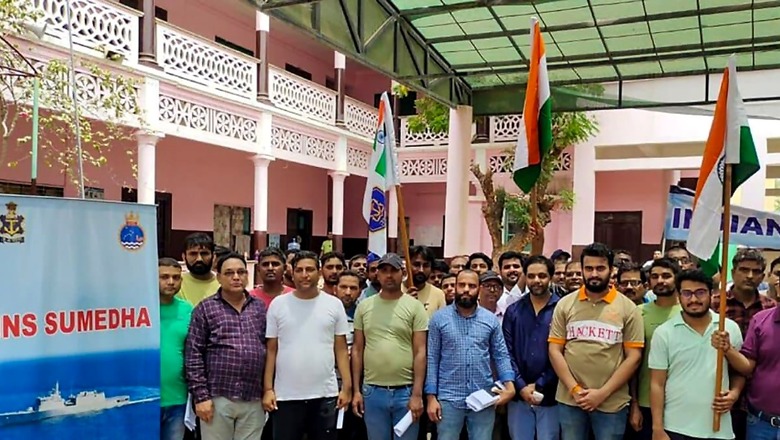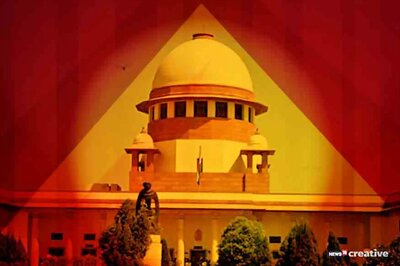
views
Operation Kaveri, which is on to bring back Indians stranded in conflict-hit Sudan, is perhaps more of an evacuation challenge for India than any other nation as the number of stuck citizens, including the Persons of Indian Origin (PIO), is higher in comparison to any other country.
During a press briefing on Thursday, the Ministry of External Affairs (MEA) for the first time gave out the number.
Foreign Secretary Vinay Kumar Kwatra said, “Our estimate is that there are approximately 3,500 Indians and 1,000 PIOs in Sudan."
#OperationKaveri progresses further.10th batch of evacuees with 135 passengers onboard IAF C-130J flight departs Port Sudan for Jeddah.
— Arindam Bagchi (@MEAIndia) April 27, 2023
According to the MEA data, 32 million NRIs and PIOs are Overseas Citizens of India (OCI), making them the world’s largest diaspora.
What makes Sudan a popular destination among Indians?
Several Indians migrated to African countries in large numbers for trade purposes and job opportunities as they were also British colonies.
Broadly, Indians living in the country fall in these categories:
- Import-exportThe Gujarati community is largely into export and import in Sudan. They import car spare parts, electronics from India and other countries to Sudan. Indians are also into the business of exporting local bajra, peanut, cotton, oil and Sudanese sugar. A number of steel units such as Liberty Steel, Omega Steel and Arti Steel, which is a subsidiary of Bhushan Group, are owned by PIOs. Orient Fan is one of the largest players in Sudan. PIOs with Gujarati roots have been staying in Omdurman area for the past 150 years.
- Blue, white collar professionals (workers, mechanics, technicians, engineers)This category consists of population from Karnataka, Kerala, Uttar Pradesh and Bihar. Since the economic growth in Sudan after the 1990s, many Indians migrated to the country for better job opportunities through friends, family and also through agencies. They are paid well in Sudan as Indian workers are skilled. Indians contribute to the IT sector in setting up computer networks, IT consultancy, etc.
- Construction worksMany Indians got into the construction business in the late 1990s. Several infrastructure projects have been carried out by Indians.
- Natural medicineThe Hakki Pikki tribe of Karnataka is popular among the Sudanese population for their traditional medicines. Sardar Tarsem Singh Saini settled in Sudan since the 1980s, who has been evacuated, said, “Indians are highly respected in Sudan. The Sudanese consider Indians their ‘guru’. Indians taught them computers and the Indian government trained Sudanese police forces. They look up to Indians."
THE HISTORY
The settled Indian community in Sudan is around 150 years old. Luvchand Amarchand Shah, a Gujarati trader who imported goods from India, is believed to have been the first Indian to go to Sudan from Aden in the early 1860s. As his business expanded, he brought his relatives from Saurashtra, who in turn invited their friends and family. This is how the Indian community grew and developed in Sudan.
From small towns in the eastern part of country (Port Sudan and Sawakin), the early Indian pioneers moved into the interiors and settled in Omdurman, Kassala, Gedaref and Wad Medani.
Indians enjoy so much respect due to their contribution to the Sudanese economy that even Indian convoys got a clear passage and the batch of evacuees were not hurt en route Port Sudan. Pankaj Chaube, one the evacuees, said, “The Sudanese respect Indians a lot. They had a clear understanding not to harass or hurt Indians. Even when our convoys were stopped, after they got to know we are Indians, we were allowed to go ahead."
Pramod Mishra, who worked as a mill designing worker in Sudan, said, “Humko lootne aaye, sir pe bandook rakha, par maar peet nahin kiya. Unko jab pata chala hum Indian hai, bina maare peete chale gaye, Indians, Chinese aur Americans ko kuch nahin kar rahe the."
The economy of Sudan has boomed on the back of increased oil production, high oil prices and large inflows of foreign direct investment until the second half of 2002. Sudan has invested in infrastructure projects and mining, with several Indian and Russian Companies into mining business.
A daring rescue!8th batch of 121 Indians arrived at Jeddah by IAF C 130 J from Wadi Seidna,Sudan.This evacuation was more complex as the location is in vicinity of Khartoum.
Family members of our Embassy Officials were also part of this group.
Warm welcome.#OperationKaveri pic.twitter.com/VcVnlmuQ1b
— V. Muraleedharan (@MOS_MEA) April 27, 2023
FROM THE MEA PAPERS
Read all the Latest India News here




















Comments
0 comment